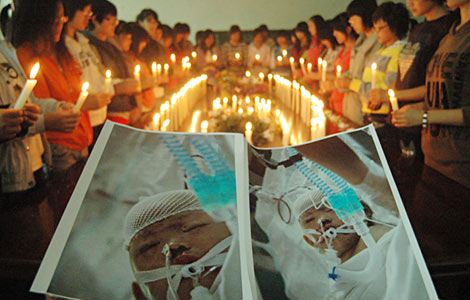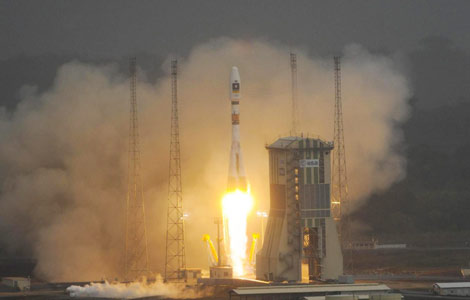Soyuz lifts off two satellites for Europe's Galileo system
Updated: 2011-10-21 21:38
(Agencies)
|
|||||||||||
KOUROU - A Russian Soyuz rocket blasted off from French Guiana on Friday bearing the first two satellites in Europe's Galileo global positioning system, a much-heralded mission that will redraw commercial competition in space.
This was the first time that Russian-built Soyuz rocket took off from a Europe's spaceport.
"All went well," said Jean-Yves Le Gall, president of the Arianespace rocket launch company, in a statement after the launch.
The culmination of more than a decade of planning, the launch had to be delayed by 24 hours from Thursday after a leaky valve was detected in the rocket's fuelling system.
The EU commissioner in charge of industry and space policy, Antonio Tajani, said a new tender would be announced on Friday for six or eight satellites of the Galileo group.
Once fully operational later this decade, the Galileo system aims to give Europeans autonomy from the U.S. government-controlled Global Positioning System. Russia says it recently completed its own similar system.
Rather than build a new rocket from scratch, Europe decided to build a 467 million euro launch pad for Soyuz in the French Guiana base where it already launches its Ariane rocket family.
France has covered more than 80 percent of the construction costs and all of the 70 million euro cost overruns.
In return, the Russian State Space Agency (Roscomos) will receive tens of millions of euros for each rocket that is built and shipped from its Samara Space Centre.
"Soyuz will give us a complete range of launchers," Le Gall told Reuters.
Arianespace plans to launch at least two Soyuz rockets a year from now on in addition to its Ariane-5 heavy-lift launcher, and the rocket series will be completed by a smaller vehicle, Vega, slated for launch next year.
Contracts for 16 Galileo satellites have already been signed: four with Franco-German maker Astrium and 12 with German company OHB. The Galileo line should have 30 satellites by 2020.
"I will announce a new tender for the construction of six or eight satellites," Tajani told reporters at the Kourou spaceport. "The signature of the new contract is planned in February."
Arianespace is principally owned by the French Space Agency (CNES) with 34 percent and Astrium, a wholly owned subsidiary of European aerospace giant EADS , holding 30 percent.
Friday's launch follows years of discussions, delays and budget disputes over Galileo since France and Russia agreed in 2003 to co-operate on Soyuz launches.
Hot Topics
Libya conflict, Gaddafi, Oil spill, Palace Museum scandal, Inflation, Japan's new PM, Trapped miners, Mooncake tax, Weekly photos, Hurricane Irene
Editor's Picks

|

|

|

|

|

|








